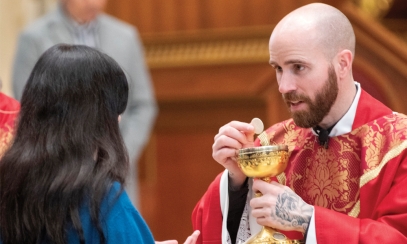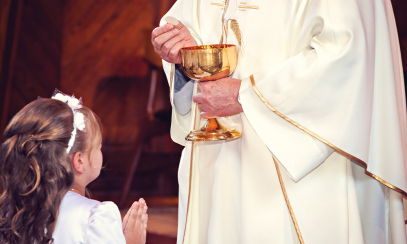
A Reasonable Act of Faith
QUESTION: Is it against reason to believe the Eucharist is truly “Jesus in disguise”?
QUESTION: Is it against reason to believe the Eucharist is truly “Jesus in disguise”?
ANSWER: This doctrine is not against reason, it is above reason; it’s a truth that had to be divinely revealed.
ANSWER: This doctrine is not against reason, it is above reason; it’s a truth that had to be divinely revealed.
In 1996, Susan Sarandon won an Oscar for her role in Dead Man Walking, in which she portrays Sister Helen Prejean, a religious sister who for decades has ministered to death row inmates. Sarandon was raised Catholic but left her faith while attending the Catholic University of America in Washington, D.C. I was struck by what she once shared in an interview – that being Catholic was a great preparation for her to become an actor. Why? In her view, Catholics have to “suspend their disbelief” in order to accept that bread and wine actually become the Body and Blood of Christ during Mass.
As the Catholic Church in the U.S. begins its three year Eucharistic Revival, Sarandon’s perspective should be taken seriously. It’s not that she failed to understand what the Church teaches about the bread and wine being transformed into the Body, Blood, Soul and Divinity of Christ at every Mass – it’s that she thought she had to push reason aside to accept this teaching. Essentially, she felt that it was unreasonable to accept as true something her senses told her was not true. Sarandon is probably not alone in having this viewpoint, and it is important for the Church to extend empathy and accompaniment to individuals who have this struggle. Don’t we all see a mere piece of bread when we receive the consecrated Host in Holy Communion?
Don’t we smell the scent of wine and taste its flavor when we receive Communion from the chalice? Isn’t it reasonable to accept what our senses are telling us? And doesn’t St. Thomas Aquinas himself affirm that, in general, we should trust our senses? The answer to all these questions is, yes! However, there are exceptional cases when what we see, taste, feel, smell or hear fails to match reality.
For instance, you are relaxing on your porch and suddenly hear a loud jet flying by. You look up and the jet is not where your ears told you it would be, so you have to shift your line of vision to where the jet is in reality. Science, of course, has an explanation for this phenomenon based on the speed of light. This is just one of many examples of how our senses are not infallible. But God is infallible, and ultimately it is on his authority that we believe in the Real Presence of Christ in the Eucharist – even though our senses perceive only bread and wine.
With regard to the Real Presence, therefore, we are called to confidently make a reasonable act of faith that the Eucharist “is truly the Lord,” based on the authority of God’s word in Scripture and the authority of the Church Christ founded. Jesus – the second person of the Holy Trinity – teaches in his Bread of Life sermon, “Whoever eats my flesh and drinks my blood has eternal life, and I will raise him on the last day. For my flesh is true food, and my blood is true drink” (Jn 54-55).
After all, which is more trustworthy in the end: our senses or God who created our senses?
Vatican II declared that the Eucharist is the “source and summit of the Christian life” in Lumen Gentium (11).
As dioceses across the U.S. embark on a three-year Eucharistic Revival, each issue of FAITH Saginaw will explore the Church’s doctrine on the Eucharist: faith that the bread and wine actually become the body, blood, soul and divinity of Christ at every Mass.



